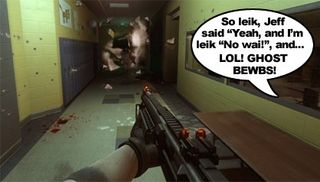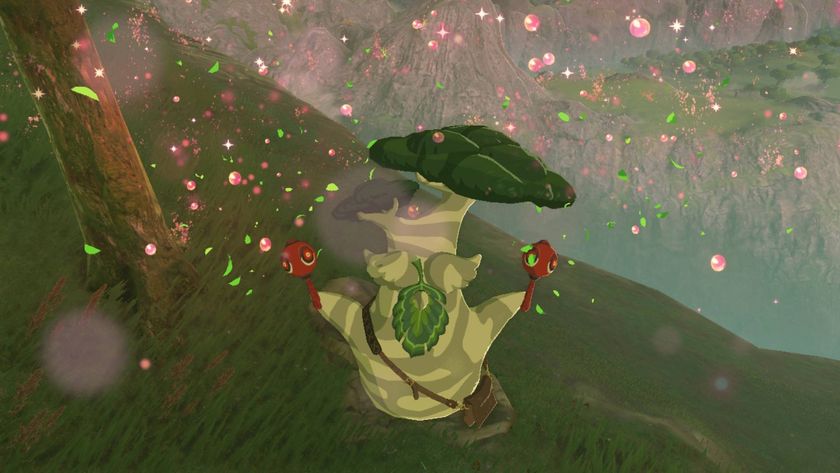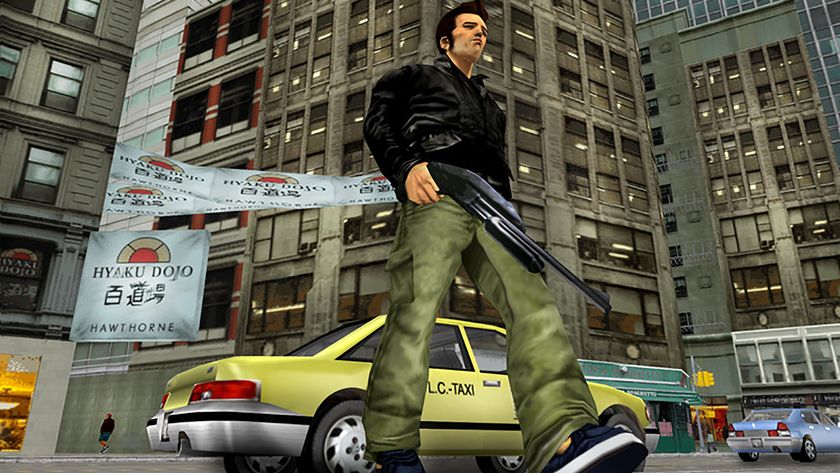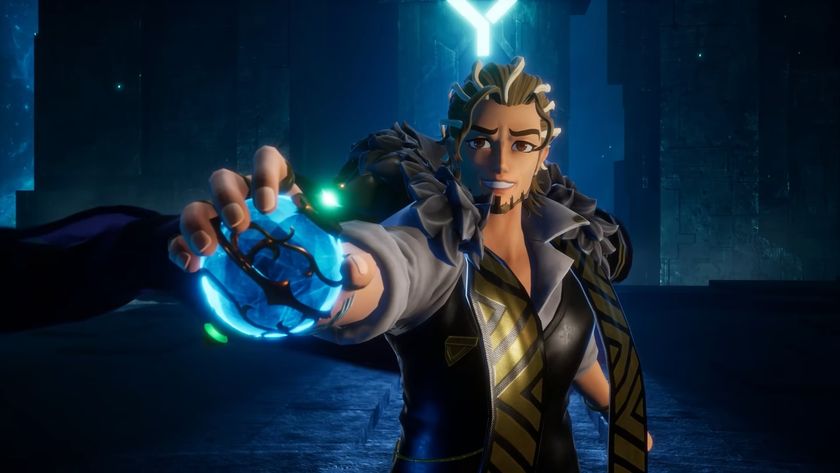Why co-op can be a terrible idea
Sharing isn't always good. In fact sometimes it's downright miserable.
Or so goes the logic of the woefully misguided. Because it actually doesn’t. No, while it’s good in the right place, co-op just for co-op’s sake is more than capable of ruining what would otherwise be a perfectly pleasant experience. Like a cheeseburger at a wedding dinner. And right now I'm really worried about theeffect that it's going to have on F.E.A.R. 3. Here's why.
Co-op kills atmosphere

Above: Ambience KILL!
The fact is, the ways in which your mind reacts to stimuli in single-player and co-op are completely different. Hunched over a monitor or goggling at your TV alone, you have a relationship only with the game. It’s you and the game-world, reacting to each other and bouncing off each other’s subsequent reactions. You’re totally immersed, and in a horror game it feels great. With a mate rambling down your ear about what you did in the pub last night, a new relationship takes over and the game becomes comparative incidental background noise.
We’retold thatin F.E.A.R. 3 ‘There'll be visions, messages and scares that one character can see that the other will remain blissfully unaware of’, but that doesn’t convince me that the atmosphere will be preserved at all. Particularly when playing online, it doesn’t matter what your partner can see. After all, singling out individual scares for each player seems a bit irrelevant whenyou're both going to be playing in rooms anyway. The fact that a co-op partner is there at all kills any possible tension. And even if you play it in single-player, the modern co-op design model means that...
Co-op NPCs kill your whole game

Above: Artifical players = realistic misery
It’s ridiculous. Really, really idiotic design. But it’s the way almost all co-op-ready games work these days. If you want to play on your own, you’ll have to carry the player two character around regardless, like the stinky old dog who followed you home, and now won’t take the hint and just piss off. Contra got it right back in 1987. In a single player game, there's a single player character. Easy.
If you choose aone-player campaign, it’s because you want the unique experience of playing on your own. Believe it or not publishers, we don’t just choose single-player because we have no friends or possess an crappy internet connection. We do it for reasons of gameplay preference and personal enjoyment. Thus, we do not need your moronic artificial friends following us around like automaton buddies for the futuristic lonely, spouting crap and trying to get involved, but only ever getting in the way of us enjoying the game you’ve made for us. When we want that, we’llpay a crack-addled hobo to come round and play with us for the night.
Sign up to the 12DOVE Newsletter
Weekly digests, tales from the communities you love, and more
Hmmm, that sounded wrong. So moving swiftly on to the next point...
Co-op kills pacing

Above: Alyx never does this, and that's why we love her
Seriously, it does. The best thing about modern single-player gaming, the absolute best thing, is the sense of taking a journey through a vibrant, detailed and beautifully-realised new world, learning about and interacting with it as part of an epic and cinematic story. Emergent gameplay and player-driven experiences might have been buzzwords for the last few years, and in multiplayer they’re exactly what it should all be about, but in campaign mode there are some things that should be left to the devs. And the way the player experiences that journey is one of them.
The order, pace and choreography of the way that story unfolds is vital to how affecting your experience of it is. Anything screws that up, and the power is lost. Examples of things that can screw that up include your mate getting stuck behind a wall for five minutes, your mate getting trapped behind a glitching door, your mate getting booted and having to start the level again and your mate wandering around looking for ammo while you’re being feverishly drawn to the next story point. Find me any way in which co-op would have improved Half-Life 2 and I’ll find you someone who is very, very wrong.
Co-op kills level design

Above: Do you really want to crawl through one while staring at your mate's arse?
Co-op does not open up the possibilities of game design. People think it does, butitdoesn't.Unless you’re playing a tactical shooter requiring innovative new ways of flanking, it actually limits level design, as the devs always have to think of two players rather than one.
Correctly and subtly signposting things for one player is a finely-tuned art form, but when it’s done right, it makes even the most linear game feel real and immensely rewarding to explore. Unless we’re taking about an open-world carnage spree, designing levels for two players to navigate simultaneously leads to wider, simpler layouts and blindingly obvious ‘Player one this way, Player two this way’ branching.
Intricacy, detail, and the freedom to explore on the player’s own tangential terms go straight out of the window. And that latter experience really can’t be emphasised enough in terms of creating a bond between the player and the game-world. Consider how brilliant a voyage of exploration and self-driven discovery the latter sections of Portal were. Now consider the fact that maybe there’s a really, really good reason Valve is keeping the co-op campaign separate in Portal 2.
But what do you think? Am I right? Is F.E.A.R. 3 fundamentally ballsed-up before it’s even started? Or am I, as I so frequently tell everyone else they are, wrong?













